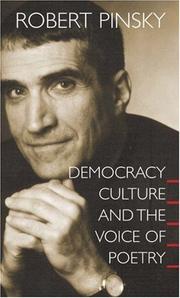| Listing 1 - 2 of 2 |
Sort by
|

ISBN: 0691096171 0691122636 9786612087318 1282087312 1400825156 9781400825158 9780691096179 9780691122632 Year: 2002 Publisher: Princeton, NJ : Princeton University Press,
Abstract | Keywords | Export | Availability | Bookmark
 Loading...
Loading...Choose an application
- Reference Manager
- EndNote
- RefWorks (Direct export to RefWorks)
The place of poetry in modern democracy is no place, according to conventional wisdom. The poet, we hear, is a casualty of mass entertainment and prosaic public culture, banished to the artistic sidelines to compose variations on insipid themes for a dwindling audience. Robert Pinsky, however, argues that this gloomy diagnosis is as wrongheaded as it is familiar. Pinsky, whose remarkable career as a poet itself undermines the view, writes that to portray poetry and democracy as enemies is to radically misconstrue both. The voice of poetry, he shows, resonates with profound themes at the very heart of democratic culture. There is no one in America better to write on this topic. One of the country's most accomplished poets, Robert Pinsky served an unprecedented two terms as America's Poet Laureate (1997-2000) and led the immensely popular multimedia Favorite Poem Project, which invited Americans to submit and read aloud their favorite poems. Pinsky draws on his experiences and on characteristically sharp and elegant observations of individual poems to argue that expecting poetry to compete with show business is to mistake its greatest democratic strength--its intimate, human scale--as a weakness. As an expression of individual voice, a poem implicitly allies itself with ideas about individual dignity that are democracy's bedrock, far more than is mass participation. Yet poems also summon up communal life.. Even the most inward-looking work imagines a reader. And in their rhythms and cadences poems carry in their very bones the illusion and dynamic of call and response. Poetry, Pinsky writes, cannot help but mediate between the inner consciousness of the individual reader and the outer world of other people. As part of the entertainment industry, he concludes, poetry will always be small and overlooked. As an art--and one that is inescapably democratic--it is massive and fundamental.
American poetry --- Culture in literature. --- Democracy in literature. --- Poetry. --- History and criticism. --- United States --- Intellectual life --- Poems --- Poetry --- Verses (Poetry) --- Philosophy --- Literature
Book
ISBN: 0803256736 0803256744 1306957206 9781306957205 9780803256736 9780803249707 0803249705 9780803256743 9780803256743 Year: 2014 Publisher: Lincoln : Baltimore, Md. : University of Nebraska Press, Project MUSE,
Abstract | Keywords | Export | Availability | Bookmark
 Loading...
Loading...Choose an application
- Reference Manager
- EndNote
- RefWorks (Direct export to RefWorks)
"A short, accessible set of prose observations about nature, place, and time, arranged (like Local Wonders) according to the calendar year"-- "Ted Kooser sees a writer's workbooks as the stepping-stones on which a poet makes his way across the stream of experience toward a poem. Because those wobbly stones are only inches above the quotidian rush, what's jotted there has an immediacy that is intimate and close to life. Kooser, winner of the Pultizer Prize and a former U.S. poet laureate, has filled scores of workbooks. The Wheeling Year offers a sequence of contemplative prose observations about nature, place, and time arranged according to the calendar year. Written by one of America's most beloved poets, this book is published in the year in which Kooser turns seventy-five, with sixty years of workbooks stretching behind him. "--
| Listing 1 - 2 of 2 |
Sort by
|

 Search
Search Feedback
Feedback About UniCat
About UniCat  Help
Help News
News